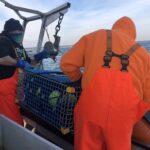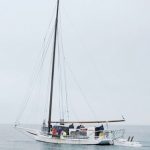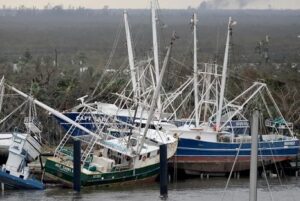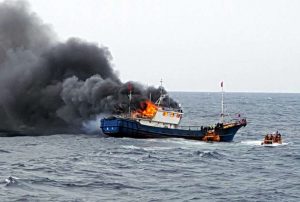Tag Archives: magnuson-stevens-act
Chairmanship puts Rubio in middle of Florida issues, integral role in reauthorizing the Magnuson-Stevens Act
 Much has been made of Florida Sen. Marco Rubio’s new post as chairman of the Senate Foreign Relations Subcommittee,,, The Republican from West Miami is expected to also chair the Senate Commerce, Science and Transportation Subcommittee on Oceans, Atmosphere, Fisheries and Coast Guard. Rubio will play an integral role in reauthorizing the Magnuson-Stevens Act, Read the rest here 12:39
Much has been made of Florida Sen. Marco Rubio’s new post as chairman of the Senate Foreign Relations Subcommittee,,, The Republican from West Miami is expected to also chair the Senate Commerce, Science and Transportation Subcommittee on Oceans, Atmosphere, Fisheries and Coast Guard. Rubio will play an integral role in reauthorizing the Magnuson-Stevens Act, Read the rest here 12:39
Lawsuit filed over new rules for hired halibut skippers
 The changes to the individual fishing quota, or IFQ, program revolve around the hired master program, and when a quota holder can have someone else catch their fish. Under the planned changes, catcher vessel-derived quota received by transfer after February 2010 cannot be fished by a hired master, with certain exceptions Read the rest here 15:21
The changes to the individual fishing quota, or IFQ, program revolve around the hired master program, and when a quota holder can have someone else catch their fish. Under the planned changes, catcher vessel-derived quota received by transfer after February 2010 cannot be fished by a hired master, with certain exceptions Read the rest here 15:21
Zone C members discuss federal rule-making – Of particular interest is the amount of cod bycatch in lobster traps
 Sarah Cotnoir, Resource Coordinator for the Maine Department of Marine Resources, alerted the Zone C Council to a New England Fisheries Management Council draft amendment to the Magnuson Stevens Act. “Lobster gear is definitely on the radar, especially in western [Casco Bay area] Maine,” said Cotnoir. “Everything and anything is on the table.” Of particular interest is the amount of cod bycatch in lobster traps, said Cotnoir. Read the rest here 08:37
Sarah Cotnoir, Resource Coordinator for the Maine Department of Marine Resources, alerted the Zone C Council to a New England Fisheries Management Council draft amendment to the Magnuson Stevens Act. “Lobster gear is definitely on the radar, especially in western [Casco Bay area] Maine,” said Cotnoir. “Everything and anything is on the table.” Of particular interest is the amount of cod bycatch in lobster traps, said Cotnoir. Read the rest here 08:37
The need for real science in Magnuson by Carmine Gorga
 If there are no fish at docks in Gloucester, it is not because there are no fish in the ocean. It is because the National Oceanic and Atmospheric Administration is virtually prohibiting fishermen to fish. The reason is that NOAA is expected by its empowering legislation, the Magnuson-Stevens Act, to prevent overfishing. But how can a dwindling family fishing fleet do the overfishing? Any open-minded observer is concluding that NOAA is applying an agenda-driven science. Read more here 14:29
If there are no fish at docks in Gloucester, it is not because there are no fish in the ocean. It is because the National Oceanic and Atmospheric Administration is virtually prohibiting fishermen to fish. The reason is that NOAA is expected by its empowering legislation, the Magnuson-Stevens Act, to prevent overfishing. But how can a dwindling family fishing fleet do the overfishing? Any open-minded observer is concluding that NOAA is applying an agenda-driven science. Read more here 14:29
Senate releases new MSA draft – I can’t wait see that! Here’s the link
![]() A new draft of the Magnuson-Stevens Act, which guides fisheries management, was recently released by the Senate Subcommittee on Oceans, Atmosphere, Fisheries and Coast Guard. Read more here Staff Working Draft 20:48
A new draft of the Magnuson-Stevens Act, which guides fisheries management, was recently released by the Senate Subcommittee on Oceans, Atmosphere, Fisheries and Coast Guard. Read more here Staff Working Draft 20:48
The warped notions of a Red Snapper Rec Shill – Red snapper management is broken
There was a time when wild duck was a staple of any Chesapeake Bay restaurant. Canvasbacks were a particular favorite. The ducks were killed by commercial hunters. Some mounted huge 4-gauge guns on the bows of their duck boats, stealthily sculled up to big rafts of ducks and maximized their kill by firing into the flock sitting on the water. Read more here 09:30
NOAA a big part of New Bedford’s groundfishing woes, says new report
![]() Magnuson lies at the root of many problems, conclude the six authors, among whom are economics professor emeritus Dan Georgianna of UMass Dartmouth and Rodney Avila, a longtime local boat owner and activist. NOAA, the arm of Congress charged with implementing the law, tilts the playing field against fishermen by imposing “conservation for conservation’s sake, said Kate Kramer, CEO of the city-based Center for Sustainable Fisheries. Read more here 05:56
Magnuson lies at the root of many problems, conclude the six authors, among whom are economics professor emeritus Dan Georgianna of UMass Dartmouth and Rodney Avila, a longtime local boat owner and activist. NOAA, the arm of Congress charged with implementing the law, tilts the playing field against fishermen by imposing “conservation for conservation’s sake, said Kate Kramer, CEO of the city-based Center for Sustainable Fisheries. Read more here 05:56
What Disaster Aid Won’t Do for Massachusetts’ Fisheries
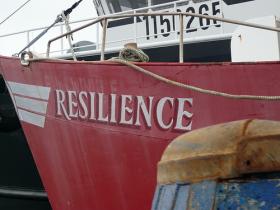 According to a deal announced last week, Massachusetts will receive nearly half of the federal disaster relief funds coming to the Northeast groundfish industry. Nobody thinks it will solve the fishery’s problems. Read more here 14:44
According to a deal announced last week, Massachusetts will receive nearly half of the federal disaster relief funds coming to the Northeast groundfish industry. Nobody thinks it will solve the fishery’s problems. Read more here 14:44
Tomorrow at 10AM, the House Committee on Natural Resources is marking up 6 bills including legislation by Chairman Doc Hastings to reauthorize the Magnuson-Stevens Act.
 The legislation would renew and amend the Magnuson-Stevens Fishery Conservation and Management Act – which governs the recreational and commercial harvest of fisheries in Federal waters – to implement common sense reforms that will promote increased flexibility and transparency, improve data collection, create jobs, and give predictability and certainty to the coastal communities that depend on stable fishing activities. Watch LIVE! Click here 18:32
The legislation would renew and amend the Magnuson-Stevens Fishery Conservation and Management Act – which governs the recreational and commercial harvest of fisheries in Federal waters – to implement common sense reforms that will promote increased flexibility and transparency, improve data collection, create jobs, and give predictability and certainty to the coastal communities that depend on stable fishing activities. Watch LIVE! Click here 18:32
Alaska: Commercial fishing groups, feds, testify on salmon management
 Alaska has managed its own salmon since statehood, and neither party is questioning that. But the United Cook Inlet Drift Association and Cook Inlet Fishermen’s Fund, who brought the lawsuit forward in February 2013, want federal oversight of salmon management — and believes that is what congress has intended in its regulations of fish in federal waters. The National Marine Fisheries Service, however,, Read more here 08:02
Alaska has managed its own salmon since statehood, and neither party is questioning that. But the United Cook Inlet Drift Association and Cook Inlet Fishermen’s Fund, who brought the lawsuit forward in February 2013, want federal oversight of salmon management — and believes that is what congress has intended in its regulations of fish in federal waters. The National Marine Fisheries Service, however,, Read more here 08:02
Bering Sea fishery management needs to change for halibut users across Alaska
![]() This year the Magnuson Stevens Act will be reauthorized by Congress. The MSA is the law by which the National Marine Fisheries Service and the North Pacific Fisheries Council manage the federal fisheries off of Alaska. In public hearings, the message that “all is well in Alaska waters” and “no major changes to the law are needed” has been echoed by many groundfish industry lobbyists. Although no one will dispute that the Bering Sea groundfish industry is a behemoth, its financial success is coming at the expense of other users. Halibut fishermen in all areas of the Bering Sea have a catch limit of 3.2 million pounds this year. The estimated bycatch cap in the Bering Sea is almost 8 million pounds. Read more here 10:58
This year the Magnuson Stevens Act will be reauthorized by Congress. The MSA is the law by which the National Marine Fisheries Service and the North Pacific Fisheries Council manage the federal fisheries off of Alaska. In public hearings, the message that “all is well in Alaska waters” and “no major changes to the law are needed” has been echoed by many groundfish industry lobbyists. Although no one will dispute that the Bering Sea groundfish industry is a behemoth, its financial success is coming at the expense of other users. Halibut fishermen in all areas of the Bering Sea have a catch limit of 3.2 million pounds this year. The estimated bycatch cap in the Bering Sea is almost 8 million pounds. Read more here 10:58
The Magnuson-Stevens Act is in Need of Congressional Attention
In a recent article titled, “The Magnuson Act: It’s a Keeper” and published in the media outlet Roll Call[1], Eric Schwaab and Bill Hogarth’s representation that the current fisheries management regime is a success and b uilt on sound science is blatantly false and amounts to no more than agency based rhetoric rather than reality. At present, there are a total of 7 Economic Disasters that have been declared by the Secretary of Commerce throughout the United States. These economic disasters are not limited to one region of the country, they span from New England, down the East Coast, into the Gulf of Mexico, and along the Pacific Coast. Read more here 16:41
uilt on sound science is blatantly false and amounts to no more than agency based rhetoric rather than reality. At present, there are a total of 7 Economic Disasters that have been declared by the Secretary of Commerce throughout the United States. These economic disasters are not limited to one region of the country, they span from New England, down the East Coast, into the Gulf of Mexico, and along the Pacific Coast. Read more here 16:41
Atlantic Coast Fishery News: Magnuson Stevens Act Questions sent to Senators on the Commerce Committee
 Atlantic Coast Fishery News Sent a series of questions to your Senators on the Commerce Committee regarding The Magnuson Stevens Act. The questions are listed here, and the answers from your representatives will be published in the next issue. Please read these questions, and feel free to comment at Fisherynation.com. Yours could be included in the published article.
Atlantic Coast Fishery News Sent a series of questions to your Senators on the Commerce Committee regarding The Magnuson Stevens Act. The questions are listed here, and the answers from your representatives will be published in the next issue. Please read these questions, and feel free to comment at Fisherynation.com. Yours could be included in the published article.
Many of the Rules adopted under the Magnuson Stevens Act have the net collective effect of preventing commercial fishermen from landing the total allowable catch in numerous fisheries in a fishing year. Some of these rules concern use and payment of federal observers, seasonal and geographical closure of highly productive fishing grounds, tight limitations on the catching or landing of various choke species that prematurely shut the target fishery (even though the target fishery is NOT overfished).19:24
Update of fisheries law pits West Coast against East Coast
The Magnuson-Stevens Act was enacted in 1976 to protect fisheries collapsing from overfishing and poaching by foreign trawlers. But the upcoming fourth reauthorization of the main federal fisheries law has split American fishing factions by coastlines. The Magnuson-Stevens Act expired last September. Republicans in the House Natural Resources Committee and Democrats in the Senate Commerce Committee have released separate bills to update the 2006 reauthorizationed Read more here 00:39
The Magnuson Stevens Act and it’s Ten Year Rebuilding Timeline: Science or Fiction? By Meghan Lapp
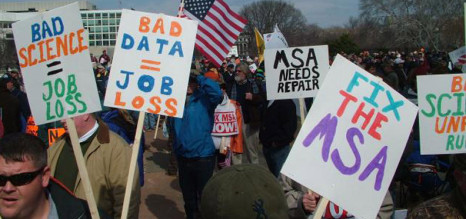 The arbitrary nature of a ten year rebuilding requirement is not a new issue. No scientific basis or analysis was involved at all in choosing a period of ten years. The requirement was a purely political decision. In fact, there are no scientific grounds for justifying any specific value as a standard for a fish stock rebuilding time. For the past several years, scientists, fishermen and Congress have highlighted the need for reconsideration of this provision. Read more here 13:44
The arbitrary nature of a ten year rebuilding requirement is not a new issue. No scientific basis or analysis was involved at all in choosing a period of ten years. The requirement was a purely political decision. In fact, there are no scientific grounds for justifying any specific value as a standard for a fish stock rebuilding time. For the past several years, scientists, fishermen and Congress have highlighted the need for reconsideration of this provision. Read more here 13:44
The Assistant Professor is very much uninformed. – Congress shouldn’t undermine conservation measures that can help rebuild New England fisheries
 For my dissertation at the Scripps Institution of Oceanography, I researched historical change in marine animal populations and coastalecosystems. Since returning to my native New England to work as a professor at Colby College, I have continued to document declining populations and ecosystem alterations. (it gets better) Read more here 00:10
For my dissertation at the Scripps Institution of Oceanography, I researched historical change in marine animal populations and coastalecosystems. Since returning to my native New England to work as a professor at Colby College, I have continued to document declining populations and ecosystem alterations. (it gets better) Read more here 00:10
Oral argument scheduled in salmon lawsuit
 The Cook Inlet Fishermen’s Fund and United Cook Inlet Drift Association allege that the federal government erred when it removed Cook Inlet salmon management from the federal salmon fishery management plan, or FMP, and allowed the State of Alaska to take over without more federal oversight. Read more here 15:39
The Cook Inlet Fishermen’s Fund and United Cook Inlet Drift Association allege that the federal government erred when it removed Cook Inlet salmon management from the federal salmon fishery management plan, or FMP, and allowed the State of Alaska to take over without more federal oversight. Read more here 15:39
A CFA or an RSDA for Community Benefit from the Fisheries
 In the Magnuson – Stevens Act that was enacted to provide a framework to manage the fisheries in the 200 miles of fish rich waters around U.S. shores, there is an intent to protect the fishing communities themselves. Not just the fishermen, but the downtown businesses, the tax coffers that fund roads, schools, etc, and the airlines and everything else that makes a community viable. Later, ‘community fishing entities’ wording was inserted as an idea to help in this process. This is a look at a current proposal for a ‘community fishing entity’ which is untried and untested and then a look at an existing State of Alaska program that would do the same thing. Read more here alaskacafe 20:36
In the Magnuson – Stevens Act that was enacted to provide a framework to manage the fisheries in the 200 miles of fish rich waters around U.S. shores, there is an intent to protect the fishing communities themselves. Not just the fishermen, but the downtown businesses, the tax coffers that fund roads, schools, etc, and the airlines and everything else that makes a community viable. Later, ‘community fishing entities’ wording was inserted as an idea to help in this process. This is a look at a current proposal for a ‘community fishing entity’ which is untried and untested and then a look at an existing State of Alaska program that would do the same thing. Read more here alaskacafe 20:36
Industry Says U.S. Fish Law Works Well in Alaska
The Magnuson-Stevens Act, the 1976 law that governs fishing in the Bering Sea, Gulf of Alaska and other federal waters, is up for reauthorization in Congress. Listen, Read more here 22:08
Three from Molly Dischner at Alaska Journal of Commerce – Magnuson-Stevens Act revisions – UFA scallops back on the menu – protections under Gulf rationalization
 Magnuson-Stevens Act revisions focus of fishers in 2014- Bycatch reporting, transparency and the role of the National Environmental Policy Act in fisheries management are among the proposed Magnuson-Stevens Act amendments the North Pacific Fishery Management Council scrutinized during its February meeting. Read here UFA wants legislature to put scallops back on the menu – The United Fishermen of Alaska are trying to revive the legislative discussion in Juneau about the vessel-based scallop limited entry program as managers and participants prepare for the new open access state-waters fishery that will open July 1. Read here Stakeholders ponder protections under Gulf rationalization -Fisheries stakeholders gathered Feb. 10 to talk about community protections in the pending Gulf of Alaska rationalization program. Read here 13:52
Magnuson-Stevens Act revisions focus of fishers in 2014- Bycatch reporting, transparency and the role of the National Environmental Policy Act in fisheries management are among the proposed Magnuson-Stevens Act amendments the North Pacific Fishery Management Council scrutinized during its February meeting. Read here UFA wants legislature to put scallops back on the menu – The United Fishermen of Alaska are trying to revive the legislative discussion in Juneau about the vessel-based scallop limited entry program as managers and participants prepare for the new open access state-waters fishery that will open July 1. Read here Stakeholders ponder protections under Gulf rationalization -Fisheries stakeholders gathered Feb. 10 to talk about community protections in the pending Gulf of Alaska rationalization program. Read here 13:52
Alaskans hear East Coast perspective on MSA

 SEATTLE — Several members of the North Pacific Fishery Management Council participated in a workshop on the Magnuson-Stevens Act Tuesday organized by the Center for Sustainable Fisheries and National Fisherman magazine. The Center for Sustainable Fisheries is a New Bedford-based nonprofit. President Brian Rothschild was the primary speaker, offering his perspective on what changes to the Magnuson-Stevens Act are needed. Read more@alaskajournal 09:26
SEATTLE — Several members of the North Pacific Fishery Management Council participated in a workshop on the Magnuson-Stevens Act Tuesday organized by the Center for Sustainable Fisheries and National Fisherman magazine. The Center for Sustainable Fisheries is a New Bedford-based nonprofit. President Brian Rothschild was the primary speaker, offering his perspective on what changes to the Magnuson-Stevens Act are needed. Read more@alaskajournal 09:26
Cook Inlet Fishermen Want Federal Fisheries Oversight
 The 300 driftnetters that belong to United Cook Inlet Drift Associaion, or UCIDA , say the state’s current Cook Inlet salmon management plan violates the Magnuson Stevens Act, and they are suing. Listen @alaskapublic.org 09:46
The 300 driftnetters that belong to United Cook Inlet Drift Associaion, or UCIDA , say the state’s current Cook Inlet salmon management plan violates the Magnuson Stevens Act, and they are suing. Listen @alaskapublic.org 09:46
Pam Anderson: Don’t limit access to Gulf’s fishery
 Many members of Congress, ours included, have realized this and are attempting to make positive changes in the Magnuson-Stevens Act of 2007. But those whose agenda is to reduce participation in the fishery, leadership in NOAA included, are more active than they have ever been in their attempts to prevent it. Read [email protected] 12:23
Many members of Congress, ours included, have realized this and are attempting to make positive changes in the Magnuson-Stevens Act of 2007. But those whose agenda is to reduce participation in the fishery, leadership in NOAA included, are more active than they have ever been in their attempts to prevent it. Read [email protected] 12:23
MSA – Federal fishery law changes leave fishing communities vulnerable – Darren Platt, Commercial Fisherman, Kodiak
 From the article – However, there are issues that both parties should be able to effectively address, despite ideological disparities. One of these is the re-authorization of the Magnuson-Stevens Act, the federal law dictating how U.S. fisheries are managed. Many within the fishing industry believe that the MSA needs to be overhauled and rewritten, as numerous intentions of the law have gone unrealized due to vagaries within the law itself. Most notable is a systematically neglected mandate within the act — the requirement that fishery managers “account for the importance of fishery resources to fishing communities.” Read more@alaskadispatch 15:35
From the article – However, there are issues that both parties should be able to effectively address, despite ideological disparities. One of these is the re-authorization of the Magnuson-Stevens Act, the federal law dictating how U.S. fisheries are managed. Many within the fishing industry believe that the MSA needs to be overhauled and rewritten, as numerous intentions of the law have gone unrealized due to vagaries within the law itself. Most notable is a systematically neglected mandate within the act — the requirement that fishery managers “account for the importance of fishery resources to fishing communities.” Read more@alaskadispatch 15:35
Council For Sustainable Fishing – Urgent — there are looming threats to fishing in 2014!
 We always hope for the best for a new year, but unfortunately commercial and recreational fishing interests face the looming threats in 2014 of more no-fishing zones, job killing “catch shares” schemes and congressional inaction on fixing the badly flawed Magnuson-Stevens Act, among others. Read more@councilforsutainablefishing 17:31
We always hope for the best for a new year, but unfortunately commercial and recreational fishing interests face the looming threats in 2014 of more no-fishing zones, job killing “catch shares” schemes and congressional inaction on fixing the badly flawed Magnuson-Stevens Act, among others. Read more@councilforsutainablefishing 17:31
Another know nothing about fishing Chef calls for stronger MSA.
 A Forum by JIM HUTCHINSON Jr.: Saltwater anglers need reasonable regulations. In a Forum published on Sunday, Chef Rob Stinson urged Mississippi’s congressional representatives to lead efforts to reauthorize and “strengthen the Magnuson-Stevens Act for future generations.” I wonder if Chef Stinson understands that the original effort to “strengthen” the federal fisheries law back in 2006 is what has helped cause serious economic hardship within the sportfishing industry due to loss of access for Gulf of Mexico’s saltwater anglers? Read more@sunherald 11:25
A Forum by JIM HUTCHINSON Jr.: Saltwater anglers need reasonable regulations. In a Forum published on Sunday, Chef Rob Stinson urged Mississippi’s congressional representatives to lead efforts to reauthorize and “strengthen the Magnuson-Stevens Act for future generations.” I wonder if Chef Stinson understands that the original effort to “strengthen” the federal fisheries law back in 2006 is what has helped cause serious economic hardship within the sportfishing industry due to loss of access for Gulf of Mexico’s saltwater anglers? Read more@sunherald 11:25
Broken Bureaucracy – Magnuson-Stevens Act – It’s All Out of Balance
 Since 1976, when the Magnuson-Stevens Act went into effect, both Captain Krusa’s regulation by natural selection and the Magnuson-Stevens Act’s promised balance between controlling harvests and protecting fishing communities have gone by the board. To be fair, the job has become extraordinarily complex, in large part because fish are hard to count, but also because the regulatory machinery, which includes government scientists, battling user groups, powerful conservation groups, and industry representatives, is broken. The result is a wasted resource and damaged communities. [email protected] 08:16
Since 1976, when the Magnuson-Stevens Act went into effect, both Captain Krusa’s regulation by natural selection and the Magnuson-Stevens Act’s promised balance between controlling harvests and protecting fishing communities have gone by the board. To be fair, the job has become extraordinarily complex, in large part because fish are hard to count, but also because the regulatory machinery, which includes government scientists, battling user groups, powerful conservation groups, and industry representatives, is broken. The result is a wasted resource and damaged communities. [email protected] 08:16
Peter Shelley throws down at the hearing: The Magnuson-Stevens Act is Working in New England
 Good morning, Senator Begich, Senator Warren, Senator Markey, Congressman Tierney, Congressman Keating, and other members of the panel. My name is Peter Shelley. I am Senior Counsel with New England’s Conservation Law Foundation. Yes you are! more@talkingfish 20:31
Good morning, Senator Begich, Senator Warren, Senator Markey, Congressman Tierney, Congressman Keating, and other members of the panel. My name is Peter Shelley. I am Senior Counsel with New England’s Conservation Law Foundation. Yes you are! more@talkingfish 20:31







 Dr. Brian Rothschild, retired UMass professor of marine science and president of the fledgling Center for Sustainable Fisheries, called for a sweeping overhaul of the Magnuson Stevens Act. He made an often-repeated observation that NOAA Fisheries lacks a balanced reading of the 10 national standards set down by Magnuson. “MSA implementation must be based on a balance among all 10 national standards (of MSA) rather than a preoccupation with overfishing,” he said.
Dr. Brian Rothschild, retired UMass professor of marine science and president of the fledgling Center for Sustainable Fisheries, called for a sweeping overhaul of the Magnuson Stevens Act. He made an often-repeated observation that NOAA Fisheries lacks a balanced reading of the 10 national standards set down by Magnuson. “MSA implementation must be based on a balance among all 10 national standards (of MSA) rather than a preoccupation with overfishing,” he said. 


























